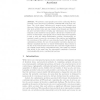719 search results - page 97 / 144 » Proving Security Protocols Correct |
SP
2008
IEEE
15 years 5 months ago
2008
IEEE
Abstract—Current web browsers are plagued with vulnerabilities, providing hackers with easy access to computer systems via browser-based attacks. Browser security efforts that re...
108
click to vote
CSFW
2010
IEEE
15 years 2 months ago
2010
IEEE
Nowadays it is widely accepted to formulate the security of a protocol carrying out a given task via the "trusted-party paradigm," where the protocol execution is compar...
105
click to vote
INFORMATICALT
2006
14 years 11 months ago
2006
Generally, the task in a distributed system must achieve an agreement. It requires a set of processors to agree on a common value even if some components are corrupted. There are s...
SCN
2010
Springer
14 years 9 months ago
2010
Springer
An identity-based encryption (IBE) scheme can greatly reduce the complexity of sending encrypted messages. However, an IBE scheme necessarily requires a private-key generator (PKG)...
FC
2009
Springer
15 years 5 months ago
2009
Springer
We present a cryptographic protocol for conducting efficient, provably correct and secrecy-preserving combinatorial clock-proxy auctions. The “clock phase” functions as a trust...


